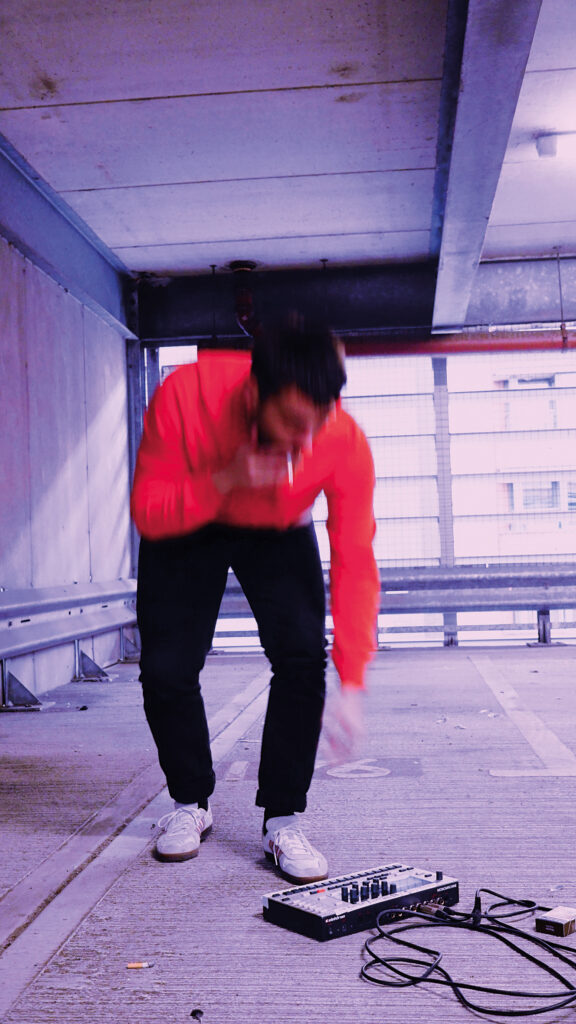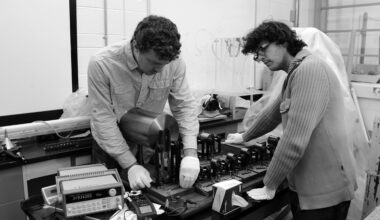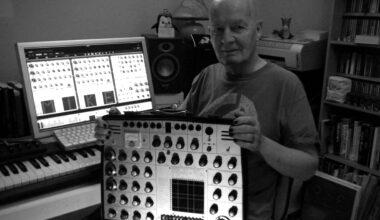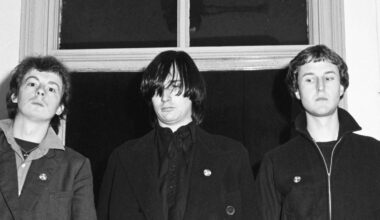One half of Factory Floor, Gabe Gurnsey strikes out on his own, the fruit of which is a debut solo outing that has a tale to tell…
“It’s a mixture of anxiety, excitement… a difficult one to put into words,” says Gabe Gurnsey, talking about the sense of anticipation he feels prior to a big night out. “I feel like the best nights are the ones that you don’t plan and you find yourself coming out of a club at seven in the morning. It’s a satisfying experience.”
The drummer, producer, synth addict and member of industrial dance outfit Factory Floor has obviously spent more than his fair share of time in strobe-lit sweatboxes. His love of electronic rhythms and hedonistic lifestyles can be heard in some of his band’s acid-licked, galvanic tracks, and especially here, on his debut solo album, ‘Physical’.
Released via Erol Alkan’s Phantasy Sound label (home of Daniel Avery, Beyond The Wizard’s Sleeve et al), ‘Physical’ largely ditches the monochrome palette and pneumatic grind of his previous work, instead focusing on a warmer sound aimed squarely at the dancefloor. Gurnsey’s muses are the dance history of Manchester, vocal house music, punk-funk, and drum machine hip hop. This is a record that celebrates going out, movement and contact, while training its lens on the more deviant aspects of club culture too.
Using Yamaha’s Reface synth (a modern, digital recreation of the company’s classics) and a Waldorf Pulse 2 (“Amazing synth, completely underrated”) throughout the record, to some extent Gurnsey has moved away from the live band feel of Factory Floor in favour of more artificial, machine made rhythms. ‘Physical’ is structured like a night on the tiles, with all the tension, release, then afterglow of a clubbing escapade.
“It’s a record about clubbing even more than it’s a record to be played in clubs,” declares Gurnsey. “Getting ready to go out, driving into town, arriving at the club, being on the dancefloor, how you get home afterwards early the next morning…”
The euphoria and heightened senses of the acid house inflected ‘I Get’ and the confusion and dislocation of ‘Sweet Heat’, with its PiL-style dub and abstract fluxes of saxophone skronk, tap into these muddled emotions. ‘New Kind’ is a bass guitar-led piece of minimalist disco-punk, somewhere between A Certain Ratio, Bush Tetras or The Pop Group, and ‘Eyes Over’ undulates to an endless synth oscillation, bright chords elevating its delirious abandon. Central to all of them are Gurnsey’s vocals: though he’s sung with Factory Floor before, this time his voice is upfront.
“Singing was terrifying, but at the same time, once I’d handed it over to a few people and they’d said, ‘This really works’, I felt more comfortable,” he says. “I love doing it. Well, live, maybe not! But we’ll see.”
‘Physical’ is about songs rather than anonymous tracks. The club sounds Gurnsey is most inspired by are the vocal house records of yesteryear, something he wanted to capture here.
“I love instrumentals, but the key thing in a track is the vocals,” he notes. “I love that celebratory feeling that you used to get in house music. A lot of clubs I’ve been to, where it’s instrumental and techno heavy, I miss that vocal element. No matter how simple it is, if vocals are in there, I find it easier to write tracks around. I was chatting to a few people and they’ve said, ‘It’s not really traditional songwriting on your album, is it?’. But I see parts of it as quite traditional. I wanted to tell a story.”
The tales that Gurnsey weaves on the album might feel familiar, in atmosphere at least, to his previous work with Factory Floor. A frisson of danger remains and a fascination with the darker side of nightclubbing permeates ‘Physical’, from the drug references of ‘You Can’ (“You can dance while I get high”) to the track title ‘Temazzy’. There are hints of sadomasochism and bondage in ‘Heavy Rubber’, featuring the vocals of Gurnsey and his girlfriend Matilda Morris in an erotically charged exchange. The sleaziness of the record is a riposte to the sanitisation of modern dance music and nods back to EBM and new beat, to proto-dance records of the 80s, not just in sound, but in an aura of anything goes unorthodoxy.
“These are situations that occur in clubs, that’s the reality of it,” says Gurnsey. “These things go on, so why not put them into a track? Lots of people do it in other genres. That’s part of the lifestyle. The drugs side of it, the sex side of it, that’s all happening in those situations. It’s nothing to be afraid of. That’s life, innit?”
Originally from Burley in Yorkshire, Gurnsey met Mark Harris, Dominic Butler and Nik Colk Void in London and formed Factory Floor in 2005. Initially signed to the highly respected Mute subsidiary Blast First Petite, their early releases, such as 2010’s ‘Lying’, mixed the disembodied vocals of Void with Gurnsey’s live drums, motorik keyboards and metallic scree, while ‘16-16-9-20-1-14-9-7’ was a propulsive techno track with a steely edge.
Drawing from industrial and post-punk, as well as some of the newer forms of dance music, here was a band with attitude, stage presence and an ability to balance disparate genres with a great sense of style.

When New Order’s Stephen Morris agreed to remix Factory Floor’s ‘A Wooden Box’, they gained a fresh notoriety. They released material through the hip dance imprint Optimo Music, collaborated with Chris Carter, and then signed to James Murphy’s DFA label.
The band’s 2013 self-titled album, featuring monstrous electronic punk agglomerations such as the acid thunder, insouciant vox and dub effects of ‘Two Different Ways’, confirmed them as a thrilling proposition. With the departure of Harris and Butler, they were shorn to a duo, but the resulting second album, 2016’s ’25 25’, saw their star ascend further. Afterwards, Gurnsey had a raft of ideas he wanted to try out that he felt would be impossible in Factory Floor.
“After the record, there was a bit of downtime, so I started writing,” says Gurnsey. “My role in Factory Floor, certainly for the live things, not so much for recording, was primarily hitting the drums. I felt like I had a lot more I wanted to explore. I’ve always played around. I love being in the studio and trying stuff out, not just rhythmical stuff but also synths, and I love buying new gear in. Last year, there were a couple of tracks written, and most of it was actually developed at the end of that process, experimenting, finding my voice a little bit, and finding what the foundations were for each idea.”
A distinct influence of American music is imprinted on ‘Physical’, and it’s one that Factory Floor fans won’t have heard from Gurnsey before: the drum thunk of hip hop. After a spell living in Los Angeles, Gurnsey was inspired to slow the beat right down for several of the album’s tracks. ‘Temazzy’ and ‘Heavy Rubber’ draw a line between the synth-heavy minimalism of rap producers The Neptunes and Timbaland, and the S&M vibe of EBM and new beat.
“I wanted to take them down a Kelis, Neptunes route,” he says. “I had this initial idea of crossing them over, putting live instruments with a hip hop production. I like contrasting elements, so it’s an amalgamation of things I love listening to.”
With the dark, mechanistic stabs and electroid bass blurts of ‘Heavy Rubber’ – which could have come equally from a Kelis record or from 1980s German electro punks Liasons Dangereuses – Gurnsey hints that these styles of music are actually remarkably similar.
“I like this idea of the new sound that these producers make, mixed with a degraded 80s production. The Neptunes are a massive influence and being a drummer is a big part of that, because they’re so rhythmical. The simplicity of things to me is really interesting.”
LA’s car culture also impacted on the making of ‘Physical’. The tune ‘Night Track’ is designed to be heard under the strobe flicker of motorway neon, its propulsive synth buzz redolent of speeding along endless freeways, its lyrics, sung by Matilda Morris, dedicated to the merging of machine and muscle memory on long drives.
“Four-four beats are always good soundtrack rhythms for cars,” explains Gurnsey. “It’s in the hip hop beats as well. I did a mix for Spotify recently and it’s mostly those two things. That’s what I love to listen to.”
The album is undeniably informed by Gurnsey’s current home of Manchester too, a place that has inspired him not just in terms of its peerless musical history, but also in its atmosphere. After his time in LA, he pined for the dirt and edge of inner city UK.
“You can feel it here in Manchester,” he says. “I know it’s a bit of a cliché, but there aren’t many cities with that kind of air to them. You do get inspired by that grittiness. It comes out in the more melancholic sounds in the record, a lot of that comes from Manchester. I see Manchester as my home now, but back then I was switching around a lot, and I like experiencing different parts of the world in that way. There were so many parts of LA that I loved, but it’s quite difficult getting about over there, and it was almost too nice. It keeps you out of the studio in a lot of ways. I was craving the history of Britain again, the old buildings, all that kind of stuff. For me, it’s down to writing in dirty cities.”
Gurnsey is set to return to the US soon for a live tour supporting one of his biggest influences, industrial rock overlords Nine Inch Nails. Trent Reznor is apparently a big fan of Factory Floor.
“He’s a fan of my record as well, which is great,” he points out. “I’d love for him to do a remix or a cover of one of the tracks. When he’s back off tour, I might see if he’s up for it.”
As for Factory Floor’s future plans, there’s a new album ready for release soon, but it’s a more unusual project than fans will be used to.
“We got commissioned to do a soundtrack for Fritz Lang’s ‘Metropolis’,” says Gurnsey. “We did that at the IMAX at the Science Museum in London last year and we actually ended up recording a lot of it during the performance. That’s coming out on a four-vinyl box set in October. It’s about two-and-a-half hours of music.”
For the moment though, Gurnsey is excited to produce more solo material. He also has a remix of Timothy Clerkin’s ‘Knife Edge Heart’ set for release around the same time as ‘Physical’.
“I want to get writing again pretty soon. I’m quite agitated in that way. Having cemented those ideas in a record, it then inspires you to do others. It makes you want to do more.”
As for the forthcoming NIN tour, there’s another aspect Gurnsey’s looking forward to.
“Hopefully I’ll be driving down a lot of highways listening to four-four beats and hip hop,” he grins.
‘Physical’ is out on Phantasy Sound






